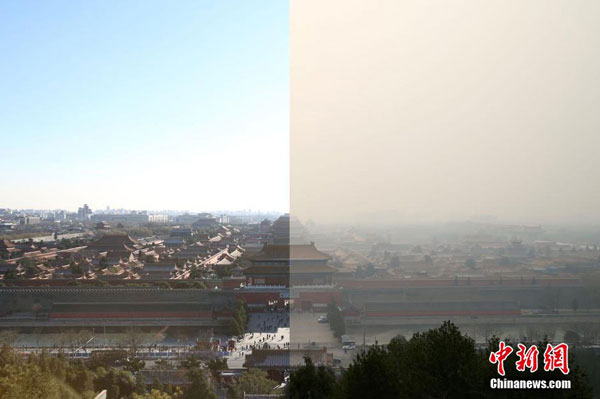Beijing, Tianjin, Hebei to jointly curb air pollution
 0 Comment(s)
0 Comment(s) Print
Print E-mail CRI, December 11, 2015
E-mail CRI, December 11, 2015
 |
|
Two photos show the Palace Museum under the clear sky on Dec. 4, and same building obscured by heavy smog on Dec. 7, 2015 in Beijing. [Photo/Chinanews.com]? |
The first red alert for air pollution in Beijing has been lifted as the sky cleared on Thursday.
But municipal officials are vowing to step up anti-smog efforts, with help from the neighboring region.
Officials of north China's Jing-Jin-Ji region, involving Beijing, Tianjin, and Hebei Province, have pledged a joint effort to combat air pollution.
Yin Hailin, deputy mayor of Tianjin Municipality, stresses the importance of working together.
"The Jing-Jin-Ji region needs to deepen cooperation in combating air pollution. On one hand, we need to improve the early warning system in a collective way to deal with the highly polluted days. On the other, we should all take measures to bring down the amount of air pollutants."
China has been pushing a coordinated effort in the development of the Beijing-Tianjin-Hebei region in recent years, relocating non-essential functions from Beijing and restructuring the economy in the region. Priority has been given to environmental protection, traffic management and industrial upgrading.
Li Shixiang, deputy mayor of Beijing, says big investment is being made in the capital city to tackle the air pollution.
"We have planned to invest 770 billion yuan in 84 key environmental projects from 2013 to 2017 in the four aspects of coal burning control, vehicle emissions reduction, dust control on construction sites and industrial reduction. Also, we will set up more air quality monitoring stations across the city. "
Li added that the 36 air quality monitoring stations will be doubled in number, and mobile monitoring vehicles will also be used.
On Monday, Beijing issued its first red alert for air pollution since the four-tier emergency response system was created in October 2013.
According to the Ministry of Environmental Protection, loose control of coal burning in the rural-urban fringe zones in Beijing, Tianjin and neighboring provinces where residents burn coal for cooking and heating contributed to the air pollution.
Yang Chongyong, executive vice governor of Hebei Province, says the province will restructure its industries to control the pollution, especially the six major high energy-consuming industries -- electric power, nonferrous metals, chemicals, iron and steel, building materials, and petroleum.
"The air pollution in Hebei Province is mainly caused by the large-scale heavy industry and the unbalanced energy resource structure. The six major high energy-consuming industries previously covered over 50 even 70 percent of the provincial economic aggregate. The number has been reduced to 40 percent now after the restructure. But such a big reform entails a great deal of work and time. On the other hand, we are still dependent on the fossil fuel, using little alternative sources of energy."
He has also appealed for more information exchanges and timely measures in the future.
Officials also pledged to improve law enforcement when it comes to pollution control.





